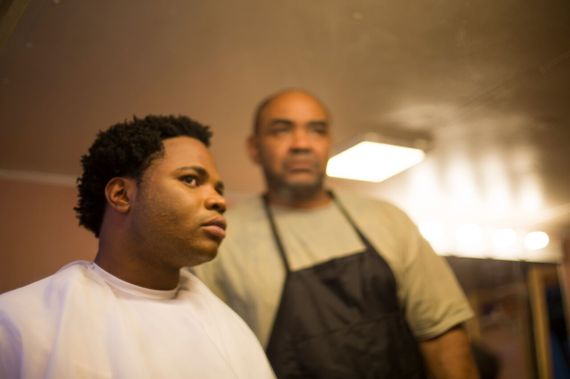Visiting a barber shop or a hair salon may seem like a luxury, but an artist who visits shelters for homeless Americans sees it as a matter of identity.
"Hair care is kind of seen as a non-essential need for people that are homeless," says Jody Wood, creator of mobile hair salon Beauty in Transition. "It's an extra maybe even some people think is superfluous, but I'm interested in trying to resist in this process of losing one's identity."
To some degree, we all struggle to find and keep our identity. But imagine the devastation of losing it slowly over time, separated from the people around you, labeled as "the homeless," ignored throughout the streets of Philadelphia by passers-by.
A traveling salon catering to homeless clients may seem unorthodox, but a simple hairstyle can help an invisible person feel visible. I never thought about it that way until I spoke to Wood about her project. Perhaps it is because I am accustomed to getting my hair cut whenever I need it. For me, it is not a struggle.
Beauty In Transition partners with various institutions and providers to create a mobile, outdoor beauty salon to serve homeless shelters throughout different cities.
It is an unexpected service, Wood says, driving around to shelters around the country in a refurbished truck that she purchased through Craigslist. Most of the stylists who volunteer their assistance are from "pop" hair salons.
"In Philadelphia, shelters are not mandated by the city," Wood says, "so you might not have a bed at night. In that daily struggle you're just thinking about how you're going to feed yourself, how you are going to feed your family. A lot of parts of identity kind of recede and because people attach a label to homelessness people will view you negatively and that hurts you more."
Wood sees homelessness as a transitional state, not as a label -- a difficult chapter in a person's life that they are hopeful to overcome one day with the help of others who are willing to give.
It would be a different world if we all decided to help our fellow man more instead of passing quick judgment and passing them by. If we placed aside all of our prejudices and insecurities, we could change not only this city but others as well.
But that may be easier said than done. We're conditioned in a way that only allows us to care about ourselves. It's not just a Philadelphia problem; it's universal, and it needs correcting.
"I want to offer a service that will express your identity however you want," Wood says. "And that's how we express our identity, through our hair and our clothing. It's a way of expressing our personality. It's who we are. And that is a luxury that is unfortunately not afforded to everyone economically."
Beauty In Transition launched in Lawrence, Kansas, in 2006, and has since travelled to Denver and New York City. Wood swung through Philadelphia in June as an artist in residence at the Asian Arts Initiative, a community-based art center located in Chinatown North.
Wood explained that shelters may have regimented scheduled. So she works with them to host the salon. "It will really be an unexpected bonus in addition to whatever services they are already offering,"
Wood says. "At first there are some brave people that actually trust us and say, 'Ya know what, I'll trust you guys, because I really need to get my hair done.' Maybe they won't sign up the first day but they'll come back after they see other people get their hair done."
Public attitude toward people who are homeless needs to change, Wood added. What's most important to realize is that housing is a human right -- like water, food and air.
Wood says that she has heard some Beauty in Transition clients say that the salon has made them feel like they are not worthless. It makes them feel that they are deserving of care.
"I think every person can help in their own way by being compassionate. And growing that compassion comes with really seeing the humanity in every single person," Wood says.
